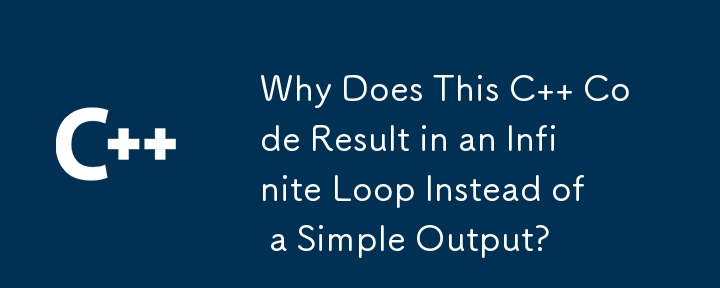Home >Backend Development >C++ >Why Does This C Code Result in an Infinite Loop Instead of a Simple Output?
Why Does This C Code Result in an Infinite Loop Instead of a Simple Output?
- DDDOriginal
- 2024-11-01 11:22:311134browse

Unexpected Endless Loop Output: A Gotcha in C Compilation
In C , certain seemingly innocuous operations can lead to unexpected behavior, as exemplified by the following code snippet:
<code class="cpp">#include <iostream>
#include <complex>
using namespace std;
int main() {
complex<int> delta;
complex<int> mc[4] = {0};
for (int di = 0; di < 4; di++, delta = mc[di]) {
cout << di << endl;
}
return 0;
}</code>
Contrary to the expected output of "0, 1, 2, 3," the code mistakenly produces an endless series of numbers. This baffling behavior stems from a subtle yet significant issue related to undefined behavior.
The Undefined Behavior Conundrum
The assignment statement delta = mc[di] accesses the mc array beyond its valid indices on the last iteration of the loop. In the realm of C , accessing memory out of bounds constitutes undefined behavior, a realm where unpredictable outcomes reign supreme.
Aggressive Loop Optimization: A Double-Edged Sword
Compilers often employ aggressive loop optimizations to enhance performance. These optimizations leverage assumptions about the absence of undefined behavior. In the case of the given code, the compiler may deduce that di < 4 always holds true, regardless of the actual array bounds, based on the presumption that undefined behavior will not occur. This assumption, in turn, removes the boundary check, allowing the loop to iterate indefinitely.
Unraveling the Mystery
GCC with optimization enabled and without the -fno-aggressive-loop-optimizations flag exhibits the infinite loop behavior. However, with that flag enabled, the erroneous behavior disappears. Inspecting the assembly code revelaes that the di < 4 check has been removed and replaced with an unconditional jump.
Avoiding the Pitfall
To guard against such pitfalls, it is crucial to avoid undefined behavior and explicitly check for array bounds. Additionally, ensuring appropriate diagnostic messages through warning flags can provide valuable insights into potential issues.
Conclusion
Undefined behavior can lead to unexpected and unpredictable behavior in C code. It is essential to be aware of such potential pitfalls and diligently adhere to sound programming practices to prevent unexpected outcomes.
The above is the detailed content of Why Does This C Code Result in an Infinite Loop Instead of a Simple Output?. For more information, please follow other related articles on the PHP Chinese website!
Related articles
See more- C++ compilation error: A header file is referenced multiple times, how to solve it?
- C++ compilation error: wrong function parameters, how to fix it?
- C++ error: The constructor must be declared in the public area, how to deal with it?
- Process management and thread synchronization in C++
- How to deal with data splitting problems in C++ development

